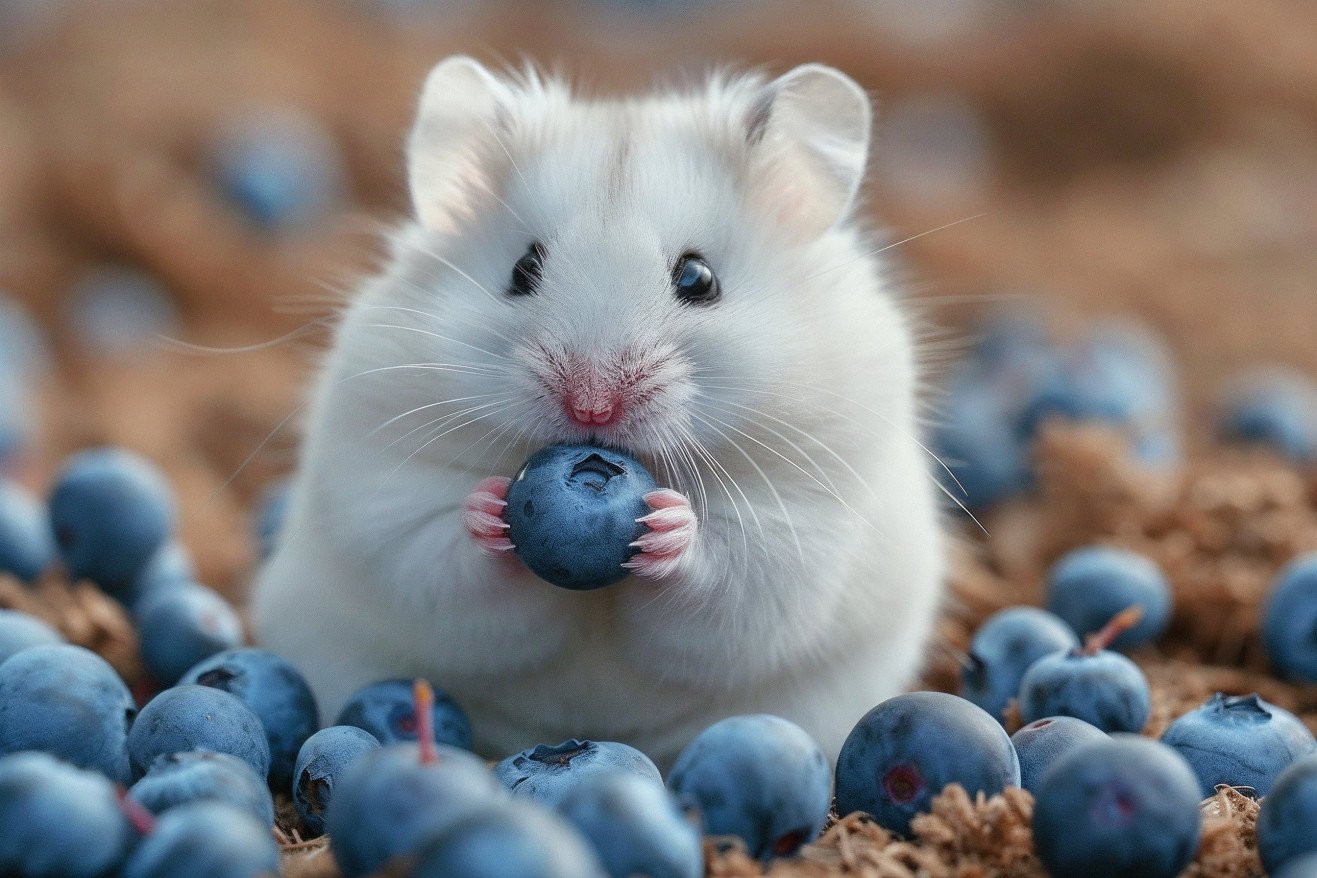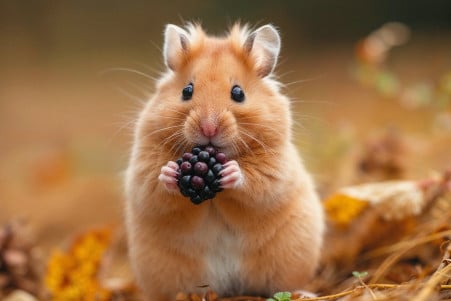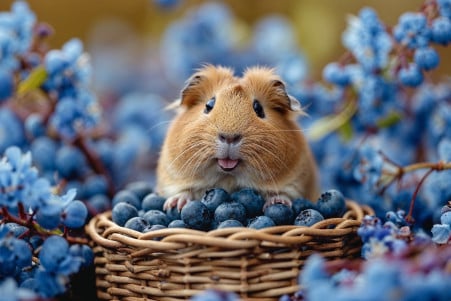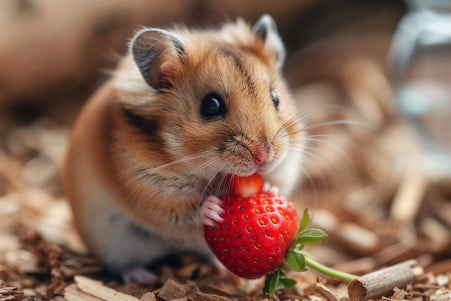Can Hamsters Eat Blueberries? The Truth About Safe Snacking
9 February 2024 • Updated 9 February 2024

With their little paws and sweet, juicy insides, it’s easy to imagine hamsters and blueberries going hand in hand. And while they can eat blueberries, they should only do so in moderation and as an occasional treat.
That’s because while blueberries are full of vitamins and antioxidants, they’re also high in sugar. As a result, it’s best to stick to a small piece to avoid health problems like diabetes and obesity in hamsters.
To take a closer look at this, we’ll cover information from vets as well as nutrition-based research that explains the ins and outs of a hamster’s diet. We’ll also cover how these little animals digest different nutrients, focusing on the sugar found in fruits such as blueberries. This will help you better understand the advantages and potential dietary drawbacks so that you can decide what treats are best for your pet.
Can hamsters eat blueberries?
Blueberries: A Healthy Snack for Hamsters
Blueberries are often considered a superfood for people, and they are packed with important nutrients that can help your small pet as well. According to Medical News Today, blueberries are a good source of vitamin C, vitamin K, and fiber, as well as several antioxidants including anthocyanins, which are responsible for the fruit’s blue color. These nutrients can help support the immune system and bone health, which can help your hamster stay healthy.
In addition, these nutrients have been associated with better heart health and a lower risk of some chronic conditions, according to the Mayo Clinic Health System. Hamsters can benefit from these properties as well, which can help them stay healthier and more active.
However, it’s important to remember that blueberries are relatively high in sugar, with about 10 grams in a 100-gram serving, according to Healthline. This means that you need to be careful about how much you feed your hamster to make sure that you’re not overloading them with sugar. This is especially important because hamsters are so small.
While blueberries may not be the best source of antioxidants for hamsters, they are a good source of them and should be fed in moderation due to their sugar content.
While freezing blueberries may reduce their anthocyanin content, Medical News Today cites research that indicates that they can still be a healthy part of a hamster’s diet if they are fed in moderation. This is why it’s important to feed your hamster a variety of fruits, making sure to consider their sugar content, to make sure that they get a well-rounded diet.
Are Blueberries Good for Hamsters?
Blueberries are a tasty treat for hamsters that can also provide some important health benefits. In addition to their sweet taste, blueberries are high in antioxidants, especially anthocyanins, which can help improve overall health and even heart health, according to Vet Explains Pets. The vitamins in blueberries can also help support different systems in a hamster’s body.
That said, blueberries should be fed in moderation. Blueberries are high in sugar, and overeating them can lead to obesity and diabetes, according to both Hepper and Pet Keen.
To help prevent these issues, it’s best to feed your hamster blueberries in small amounts, with Vet Explains Pets recommending one to two regular-sized blueberries once a week for an adult hamster and half that amount for dwarf hamsters. When you first start feeding your hamster blueberries, give them a small piece mixed in with their regular food, and then gradually increase the amount if they don’t have any negative reactions.
Watch your hamster for signs of digestive upset, such as diarrhea, which can indicate that they’ve eaten too many blueberries. Make sure to wash the blueberries thoroughly to remove any pesticides before feeding them to your hamster, and remove any uneaten blueberries from their cage to prevent them from spoiling. By following these guidelines, you can add blueberries to your hamster’s diet in a way that’s safe and healthy.
Fruit Sugar and Hamster Health: Finding the Right Balance
When it comes to choosing the best treats for your hamster, the sugar content of the food is one of the most important factors to consider. According to Medical News Today, some fruits, such as bananas and grapes, have a high sugar content due to their natural sugar content. While blueberries are a good option, their sugar content can still lead to health problems if they are eaten in excess.
As Small Pet Select explains, hamsters can develop diabetes, which can cause symptoms like increased thirst and urination, unexplained weight loss, and a sweet smell in the urine. According to the Cleveland Clinic, even natural sugars from fruit can increase the risk of diabetes if they are not eaten in moderation.
To make sure that your hamster stays healthy, it’s important to compare the sugar content of different fruits. For example, a large orange has about 17 grams of sugar, while a cup of grapes has about 23 grams. Choose fruits with lower sugar content and make sure to serve them in small portions to help control your hamster’s sugar intake.
It’s important to make sure that your hamster gets a well-rounded diet that includes sugar in moderation. By making sure that your hamster’s sugar intake is limited, you can make sure that they get the benefits of eating fruit without the potential health risks. As with any sugary treat in a hamster’s diet, remember that less is more.
How to Create a Healthy Diet Plan for Your Hamster
To make sure your hamster is getting all the nutrients they need, it’s important to feed them a combination of pellets, seeds, fresh food, and the occasional treat. PetHelpful notes that a good hamster diet should be made up mostly of pellets or a compound pellet ration to avoid selective feeding on high-fat seeds.
The Spruce Pets also recommends feeding fresh foods in small amounts, with fruits and vegetables making up about 20% of a hamster’s diet.
While fruits like blueberries can add some variety and nutrition to your hamster’s diet, they should be supplemented with other options. The RSPCA suggests feeding vegetables like carrots, kale, and cucumbers, as well as safe fruits, with the exception of citrus and dangerous options like grapes or rhubarb. That said, it’s important to feed these options in moderation to avoid digestive issues and ensure your hamster stays healthy.
There are also certain foods that hamsters should never eat because they can be toxic. These include high-sugar freeze-dried fruits, citrus, and high-fat, high-calorie treats, which can be especially dangerous for dwarf hamsters, who are prone to diabetes.
In general, it’s best to introduce new foods slowly and always check with a vet before making any changes to your hamster’s diet. That way, you can make sure you’re meeting your hamster’s nutritional needs and supporting their mental well-being.
Hamster Digestive System: Why Blueberries Must Be Eaten in Moderation
The hamster’s digestive system is well-suited to its omnivorous diet, which includes grains, insects, and the occasional fruit like blueberries in the wild. According to Zooplus Magazine, the hamster’s single-chambered stomach and cecum, which ferments fibrous materials, make it possible for the animal to absorb nutrients from a wide range of foods.
While this system is efficient, it also makes hamsters especially susceptible to sudden changes in their diet, especially those that involve an increase in sugar.
The importance of fiber in a hamster’s diet can’t be overstated. Fiber helps with digestion and is essential for maintaining a healthy gut flora, which is important for a hamster’s overall health. However, the Merck Veterinary Manual reports that a diet that’s high in sugar can lead to digestive issues in hamsters, including diarrhea, which is often referred to as “wet tail” and can be deadly if it’s not treated.
While blueberries are a great source of antioxidants and can be part of a healthy diet, they should be fed to hamsters in moderation because of their sugar content. If hamsters are fed fruits that are high in sugar, it can upset their digestive system and lead to health problems.
As a result, knowing about the hamster’s digestive system can help pet owners make good choices about treats like blueberries so that they can give them to their pets without any negative consequences.
Final Thoughts: Blueberries and Your Hamster’s Health
In summary, blueberries can be a great addition to your hamster’s diet if they are fed in moderation. They are nutrient-dense and provide vitamins, fiber, and antioxidants, all of which can benefit hamster health when part of a well-rounded diet.
Yet, there is a downside to blueberries, and that is their sugar content. It is important for hamster owners to realize that, while healthy, blueberries should be fed in small amounts to avoid the risk of obesity and diabetes, both of which are common health problems in small animals.
This article has repeatedly stressed the importance of a well-rounded hamster diet, the importance of moderation, and the importance of consulting with a vet before making any changes to your pet’s diet. Your pet’s dietary requirements are unique, and understanding how their bodies work is essential for their health.
We encourage responsible pet ownership, which means making educated decisions about the treats you feed your pet to ensure they are happy and healthy. Remember, the path to good health for your hamster is a team effort between you, your pet, and your vet. Make every small treat a conscious step toward a long, healthy life for your pet.


